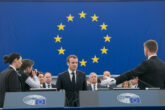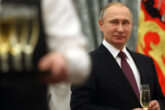May 09, 2018
Getting Out and About: Talking with Americans Beyond Washington About Their Place in the World
On any given day in Washington, dozens of think tanks that work on national security issues are busy drafting policy memos, meeting with embassy staff and foreign visitors, testifying before Congress, conducting press interviews, raising funds for their research, and hosting events, all in an effort to shape U.S. foreign policy. But in the weeks and months following the 2016 election, the normal rhythm of think tank work slowed considerably. The election of Donald Trump as America’s 45th president raised some fundamental, and at times, paralyzing questions for Washington’s think tank community. How did so many wonks both on the left and the right miss America’s growing disaffection with globalization, a phenomenon that helped bring Trump to power? It is incumbent upon everyone who works in national security to ask ourselves what that fact says about the disconnect between Washington and the rest of the country. With an administration that prides itself on disregarding conventional expertise, we must also pose the question: What role should think tanks play moving forward?
Many of us in Washington are still mulling over those questions. But at the think tank where I work, the bipartisan Center for a New American Security (CNAS), my small team working on transatlantic security issues quickly came to the conclusion that it was time to try something different. Instead of spending most of our time interacting with other national security experts in Washington (both in and out of government) and meeting with allies and partners abroad, we needed to engage new audiences across the United States. We needed to escape the proverbial Beltway bubble. And because my program’s mandate is to focus on transatlantic relations, my team knew that whatever initiative we were going to develop would need to include European national security experts as well.
Read the Full Article at the Texas National Security Review
More from CNAS
-
Drones over Poland with Doug Lute and Kurt Volker
In the early hours of September 10th, Polish authorities detected 19 Russian drones over Polish airspace. This incident represents a major escalation, with Poland triggering A...
By Andrea Kendall-Taylor & Jim Townsend
-
Defense / Transatlantic Security
Europe’s Delusions Over What It Means to Deter RussiaToday’s European leaders are in a Singapore trap, crafting a training mission designed to signal resolve rather than achieve an actual military objective....
By Franz-Stefan Gady
-
Melting Arctic Ice is a National Security Threat
China’s footprint in the Arctic is already growing, and the development of civil-military capabilities in some of its established polar research stations could provide the fou...
By Kate Johnston & Maeve Drury
-
The Wrong Way to Do Diplomacy With Russia
In fact, the summit helped Putin legitimize Moscow’s grievances, giving Russians who might doubt the wisdom of the invasion reason believe that it was, as Putin promised, just...
By Celeste Wallander




